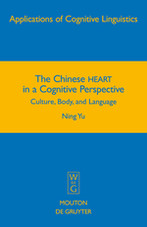Yu, N. (2009). The Chinese HEART in a Cognitive Perspective: Culture, body, and language. Berlin: de Gruyter Mouton.
This book is a cognitive semantic study of the Chinese conceptualization of the heart, traditionally seen as the central faculty of cognition. The Chinese word xin, which primarily denotes the heart organ, covers the meanings of both "heart" and "mind" as understood in English, which upholds a heart-head dichotomy. In contrast to the Western dualist view, Chinese takes on a more holistic view that sees the heart as the center of both emotions and thought. The contrast characterizes two cultural traditions that have developed different conceptualizations of person, self, and agent of cognition.
The concept of "heart" lies at the core of Chinese thought and medicine, and its importance to Chinese culture is extensively manifested in the Chinese language. Diachronically, this book traces the roots of its conception in ancient Chinese philosophy and traditional Chinese medicine. Along the synchronic dimension, it not only makes a systematic analysis of conventionalized expressions that reflect the underlying cultural models and conceptualizations, as well as underlying conceptual metaphors and metonymies, but also attempts a textual analysis of an essay and a number of poems for their metaphoric and metonymic images and imports contributing to the cultural models and conceptualizations. It also takes up a comparative perspective that sheds light on similarities and differences between Western and Chinese cultures in the understanding of the heart, brain, body, mind, self, and person.
